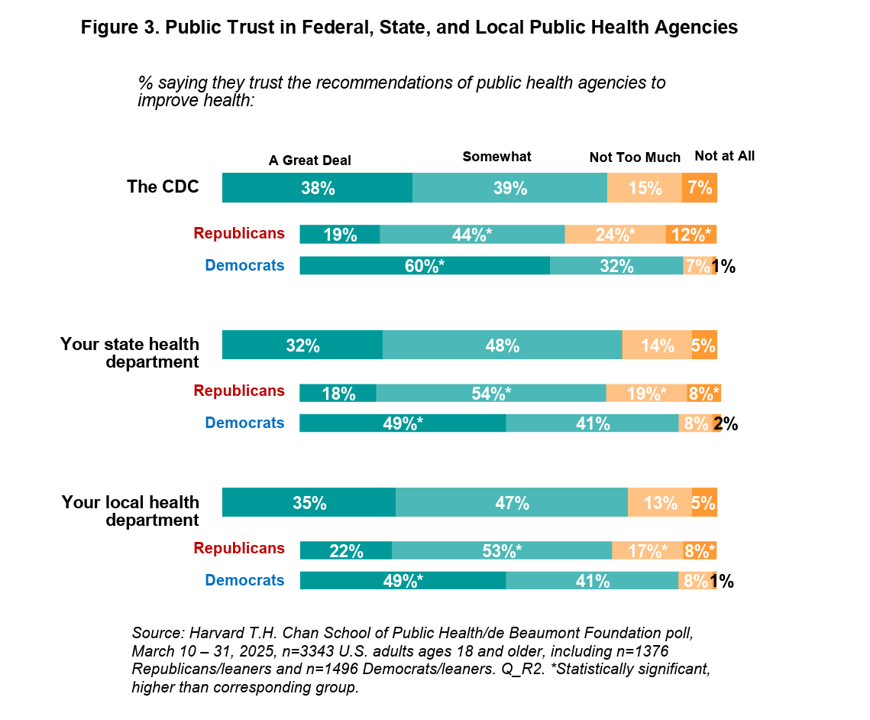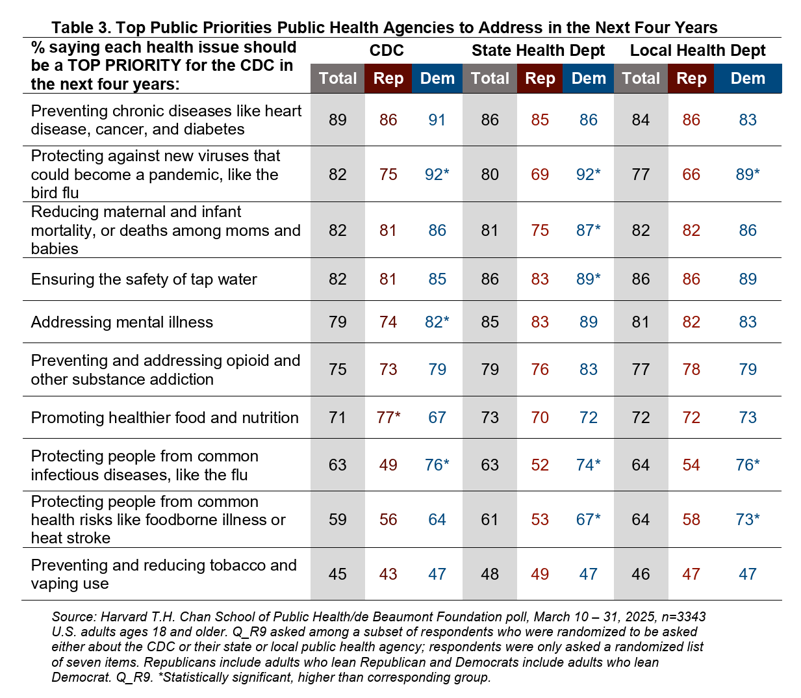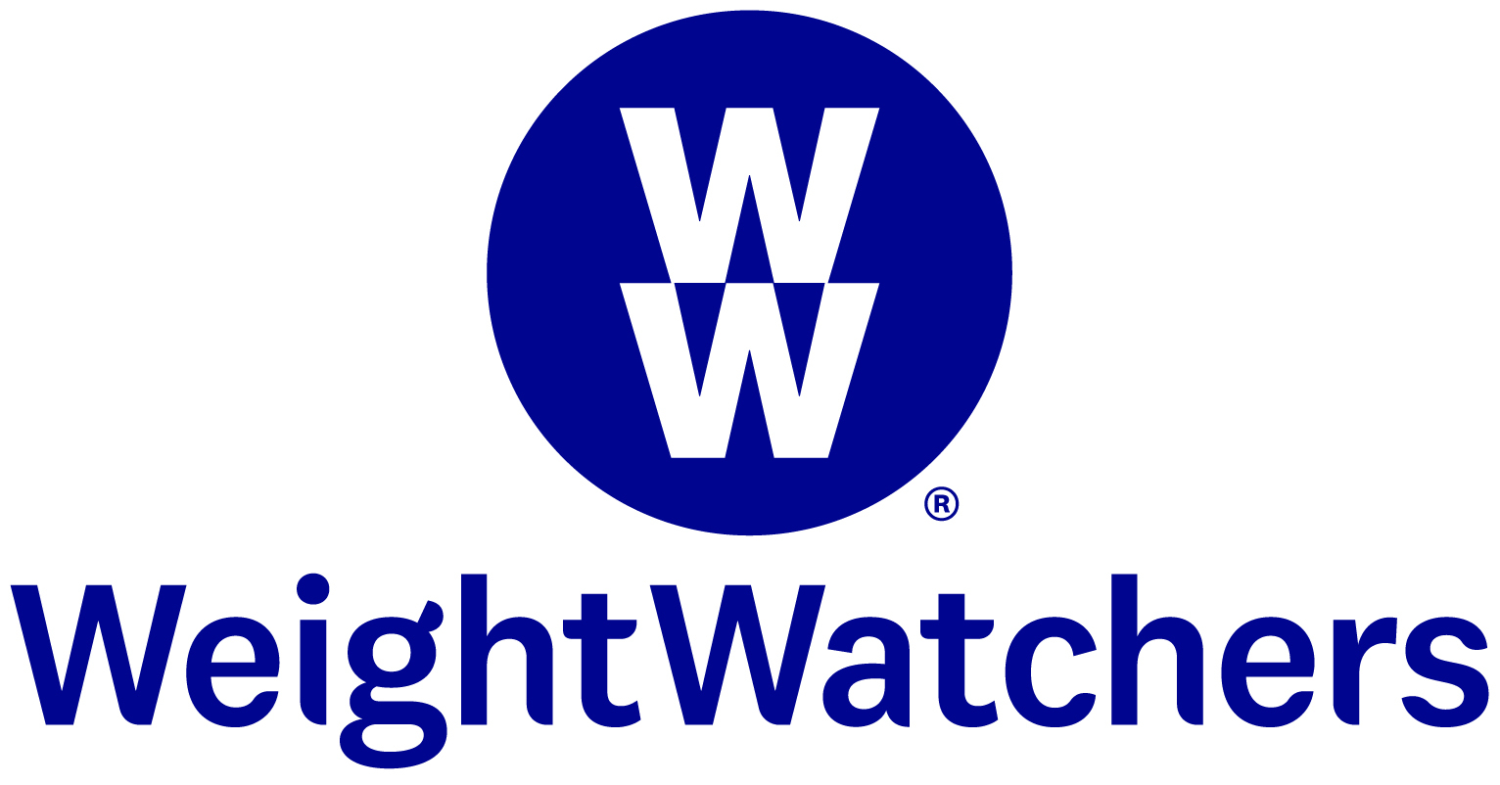HealthPopuli.com – Read More
While health citizens’ trust in the “messengers” of health information has become polarized by partisans’ political views, there is real concordance of support for many public health priorities. We weave together two current studies to come to this realization: the latest (April 2025) KFF Tracking Poll on Health Information and Trust, KFF’s ongoing health survey (published 6 May); and, the de Beaumont – Harvard Chan School of Public Health poll into Americans’ views on public health in “the first 100 days” of President Trump’s presidency.

First, consider the KFF study, conducted among 1,380 U.S. adults for the study between April 8-15 2025, online and by telephone. The questions focused on trust in health information on vaccines and disease outbreaks, and feelings about public agencies as sources for that information.
This first chart from KFF’s survey puts trust in peoples’ doctors and children’s pediatricians at the top of the most-trusted list of sources for reliable vaccine; net positive 82% for personal doctors and providers, and net positive 81% for the pediatricians. In third place was the local public health department, followed by the CDC and the FDA.
One-half of U.S. consumers ranked pharmaceutical companies as a most-trusted source for vaccine information.
Robert F. Kennedy, Jr., and President Trump, ranked in last place as trusted sources for vaccine info, among 41% and 37%, respectively.

At the more granular partisan level, these statistics on trust dramatically vary based on political identity:
- Nearly identical proportions of Republican adults rank Robert F. Kennedy, Jr., and President Trump, as trusted sources on vaccine information as think their doctors and pediatricians are
- Among Democrats, the most-trusted sources for vaccine information are personal physicians and providers, pediatricians, local public health departments, and the CDC, FDA, and their child’s school or daycare site roughly equal as channels for vaccine-trusted info.
- Independent voters fall pretty much between Democrat and GOP voters by percentages trusted these various sources for vaccine-reliable information — with lower proportionality in trust for RFK, Jr., and President Trump,

This particular data point illustrates an important nuance that clearly illustrates how politics shift a U.S. consumer-voter’s trust in vaccine-reliable information sources. In the past several years, Democrats and most Independent voters have trusted the CDC and FDA (read: Federal health agencies) as vaccine-information sources of truth and reliability.
But check out the big shift backward among Democrats between September 2023 (when Joe Biden was President) and April 2025 (in President Trump’s second term): in late 2023, 86% of Democrats trusted the FDA, sliding down to 67% in April 2025; in late 2023, 88% of Democrats trusted the CDC for the information, dropping to 70% supporting the agency as a source of reliable vaccine info.
Republicans’ support for the FDA and CDC worked in the opposite direction: increasing from 42% in April 2025 rising to 52% in 2025 for the FDA as vaccine-trusted info course; and, increasing to 51% of Republicans trusting the CDC in April 2025 versus a lower 40% in September 2023.

Health Populi’s Hot Points: ‘Tis the season for polling trust (or mis-trust depending on your half-glass full or empty perspective). To the KFF April 2025 tracking survey, we can add in a new study from the de Beaumont Foundation and the Harvard Chan School of Public Health to complement the insights from KFF.
Here in the bar chart, we see that overall, net, 77% of U.S. adults trusted the CDC to improve health (a different question than KFF’s on vaccine information, but useful insight into peoples’ trust in the agency). By political party, that split into 63% of Republications and 92% of Democrats.
Trust overall in an American’s state health department as well as local health department was higher overall (80% net trust for state health dept. and 82% net trust for local health departments. This split into 72% of Republicans trusting state health departments and 75% trusting local health departments, illustrating that Republican voters tended to trust state and local departments more than the Federal CDC.

Akin to the KFF poll, de Beaumont + Harvard Chan found that Democrats’ views of trust in eroded with the on-boarding of “new people in charge of federal public health agencies:” focusing on the orange bar segments, we see that 76% of Democrats said they trusted health recommendations coming from federal public health agencies a little or a lot less — a dramatic shift in loss of trust among the Democrat voters.

On the upside, there is agreement among Republicans and Democrats supporting specific public health priorities: namely,
- Preventing chronic diseases like heart disease, cancer, and diabetes
- Protecting against new viruses that could evolve as a pandemic )e.g., bird flu)
- Reducing maternal and infant mortality, deaths among moms and babies
- Ensuring the safety of tape water
- Addressing mental illness, and,
- Preventing and addressing opioid and other substance addiction.
How to bolster trust in science-based information in this super-politicized environment?
Matthew Facciani, a social scientist affiliated with the University of Notre Dame, recently wrote this thoughtful essay on Substack asking and answering a similar question to mine posed here: How can we rebuild trust in science and health? Start small, think big, Matthew recommends.
His proposal is three-fold:
- At the micro-level, start with competence and warmth, and embrace uncertainty. Matthew discusses various research studies with evidence showing that listening and validating concerns with patients and questioning communities can prevent people from “falling into misinformed echo chambers.” This builds the “warmth side of trust,” Matthew asserts.
- At the meso (mid) level, building trust through community relationships, something I’m long involved with from the urban barbershop to the YMCA and the grocery store. What helps is to frame science as personally relevant, Matthew nots, as being close to peoples’ lives increases credibility. This means partnering with local leaders, supporting citizen science through local authorities, and having scientists “show up” locally.
- At the macro level, embrace scientific transparency and institutional reform, revealing financial ties, publishing null results, making data publicly accessible, and improving diversity and inclusion.
This is a relationship-building process — not transactional — but time-investing and empathy-building.
The post Americans’ Trust in Public Health Agencies Has Become Politicized, Though There is Bipartisan Support for Many Public Health Priorities appeared first on HealthPopuli.com.





